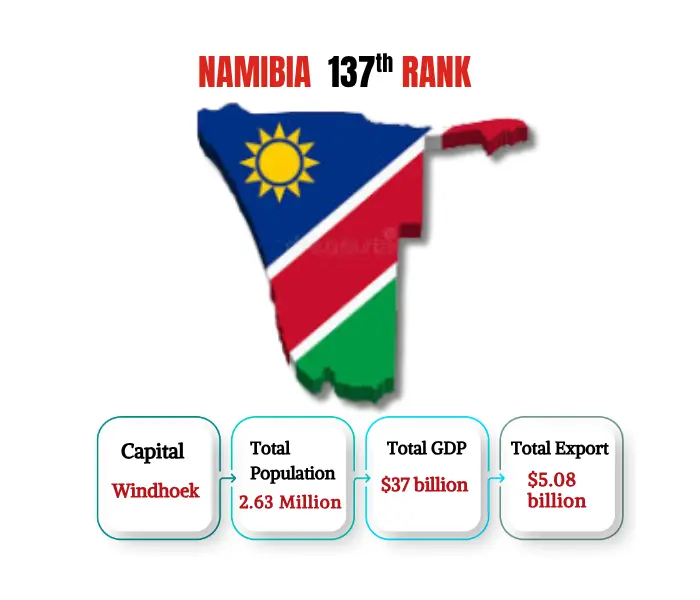namibia exportDATA
Accurate & Updated namibia export Data
Utilise our extensive namibia export data to unleash the potential of your company. To propel your performance in the namibia market, acquire insightful knowledge about top commodities, trade possibilities, and top trading partners.
Our namibia Trade Data offers a detailed picture of the trade environment in namibia through carefully selected export data. To find the finest markets and improve your trading tactics, use comprehensive trade data.
Use premium export data from namibia to stay ahead of the competition in the global commerce game. Use trustworthy trade data and insights to guide your decision-making as you expand your company in the namibia market.
The image highlights major global import categories across various industries, showcasing the diverse range of products traded internationally. It reflects the importance of sectors like energy, machinery, technology, healthcare, and luxury goods in global commerce. These categories play a crucial role in shaping international trade dynamics and economic development.

Rank
118
The country holds the 118 positions globally in exports, highlighting its strong presence and influence in the international trade and export arena.
Share
0.2%
With a 0.2% share in global export trade, the country’s growing presence in the international export market is clearly gaining momentum.
Leading Partner
BOTSWANA
Botswana plays a vital role as the country’s largest export partner, leading in both the value of goods exported and overall export share.
Biggest commodities
PRECIOUS STONES AND METALS
Precious stones and metals stand as the country’s largest export commodity, significantly contributing to its economy.
export
Top 10 export of namibia : Detailed export Data by HS Code
Occupying a noteworthy location in international trade, namibia engages effectively in foreign business, with its export serving as the primary engine of growth. As per the available data, namibia top 10 export for the year 2025 included:
- Precious stones and metals, pearls (HS code 71): 40.88% ($2.24 billion)
- Ores, slag, and ash (HS code 26): 16.93% ($928.86 million)
- Fish and other aquatic invertebrates (HS code 03): 13.27% ($728.23 million)
- Mineral fuels and oils (HS code 27): 5.45% ($298.91 million)
- Copper and articles thereof (HS code 74): 4.71% ($258.44 million)
- Salt, sulfur, lime, and cement (HS code 25): 1.94% ($106.40 million)
- Nuclear reactors and machinery (HS code 84): 1.69% ($92.97 million)
- Live animals (HS code 01): 1.48% ($81.20 million)
- Meat and edible meat offal (HS code 02): 1.43% ($78.50 million)
- Printed books and newspapers (HS code 49): 1.37% ($75.07 million)
Exploring the Key Metrics in namibia export Data
We collect reliable and verified trade data from trusted sources, including organizations, shipping companies, government authorities, and customs ports. This trade data covers a wide array of valuable fields such as HS codes, product descriptions, pricing, quantities, origin and destination countries, port names, and currency values. For traders and marketers, this data is a powerful resource that supports well-informed business decisions. Every detail—from product classification and descriptions to the exact volume and cost of goods—is available through this comprehensive trade dataset. To give you a clearer picture, we have provided a sample of this data to help you understand its depth and structure.
namibia export data specifically refers to detailed information on the goods and services exported by the namibia to global markets. It includes essential aspects like commodity type, HS code, export destination, shipment quantity, and transportation mode. This data plays a critical role in tracking global trade movements, guiding policy development, and supporting strategic planning for businesses. Understanding U.S. export data is important for several reasons. It allows businesses to discover new and growing markets, pinpoint export opportunities, and analyze the global competitiveness of U.S. industries. With insights drawn from sector-wise export performance, policymakers and industry leaders can identify strengths and weaknesses and implement strategic initiatives to boost growth and global reach.
Key Advantages of Accessing namibia export
- Export statistics help researchers, analysts, and economists assess the performance and overall health of the namibia economy.
- Generate high-quality leads directly from the namibia export market.
- Stay updated on the latest product demand trends in the namibia export sector.
- Monitor competitor activity and stay ahead in the global trade landscape.
- Build effective marketing strategies backed by accurate export data insights.

Frequently Asked Questions
namibia export data provides detailed information about goods shipped from the export to international destinations. At Cypher Exim, we make this data actionable for businesses aiming to understand global trade trends, identify opportunities, and grow internationally.
You’ll get access to HS codes, product descriptions, export values, shipment volumes, exporting ports, and destination countries—everything you need to track demand, monitor competitors, and make smart trade decisions.
At Cypher Exim, we provide regularly updated data—typically refreshed monthly—so you’re always working with the latest trade intelligence.
Absolutely. Whether you're a startup or a growing exporter, Cypher Exim's export data can help you discover untapped markets, competitive prices, and optimize your logistics and marketing strategies.
Yes! Our platform helps you pinpoint high-potential export markets by showing where specific products are most in demand. With Cypher Exim, you can confidently target regions that align with your trade goals.